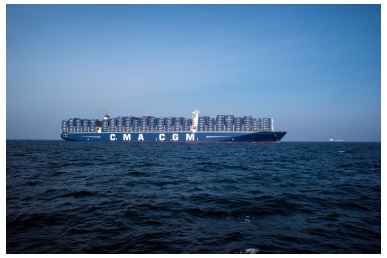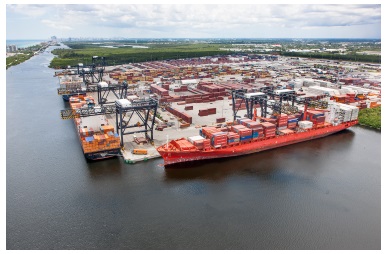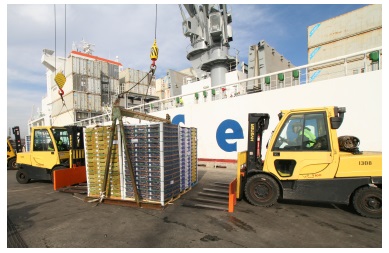Operations: Los Angeles/Oakland, Port Everglades, Santa Marta, Wilmington (DE)
![]() Print this Article | Send to Colleague
Print this Article | Send to Colleague
CMA CGM Benjamin Franklin, an 18,000-TEU vessel operated by French ocean carrier CMA CGM, will call at the Port of Los Angeles on December 26. It will be the largest container ship of this capacity ever to call at any port in the United States. It is also scheduled to call the Port of Oakland five days later, on December 31.
Delivered on December 5, the brand new CMA CGM Benjamin Franklin is deployed on the Pearl River Express service, which links the Chinese ports of Xiamen, Nansha and Yantian with the U.S. West Coast. The ship is about a third larger than the biggest container ships that currently call at the San Pedro Bay port complex.
Jacques R. Saadé, CMA CGM Group Chairman and Chief Executive Officer, made the decision to deploy the ship in the U.S. trade. With this call, CMA CGM says it is "furthering its strategy of providing customers with the reach of a global network combined with the convenience of a personal service." It also "reflects CMA CGM’s faith in the long-term growth potential of the U.S. economy, and its commitment to increasing its U.S. market share."
Headquartered in Marseilles, CMA CGM entered the U.S. market in 1997. It now offers 23 shipping services connecting the United States to the rest of the world and employs more than 800 people in the country through its subsidiary CMA CGM (America) LLC.
The company says it has been working closely with the ports of Los Angeles and Oakland to ensure there is sufficient infrastructure to support an 18,000 TEU vessel and "looks forward to working with other ports throughout the U.S. as they begin similar assessments of their infrastructure."
"Together with the Board of Harbor Commissioners, we appreciate the confidence CMA CGM has instilled in the Port of Los Angeles, and the opportunities this vessel call will provide to APM Terminals, longshore labor and supply chain partners," said Los Angeles Port Executive Director Gene Seroka. "Earlier this year APM Terminals, longshore, and land-side logistics partners efficiently processed three 13,000 TEUs ships concurrently producing more than 38,000 container moves over an 8-day period. The arrival of the CMA CGM Benjamin Franklin signals a new chapter in Pacific Rim trade flow and supply chain optimization."

CMA CGM Benjamin Franklin has a deadweight capacity of 185,000 metric tons, length of 398 meters/1305 feet, beam of 54 meters/177 feet, and draft of 16 meters/53 feet. Container capacity of 18,000 TEUs includes 1,100 reefer TEUs.
Photo/CMA CGM
Florida International Terminal LLC (FIT) celebrated its 10th anniversary at Port Everglades by renewing its marine terminal lease for 10 more years. The port estimates the agreement will generate 128,000 TEUs annually and $57 million during that 10-year period. It also includes two five-year renewal options.
During the initial contract period, FIT's Port Everglades more than doubled, from 76,170 TEUs in FY 2006 to 156,045 in FY 2015. The port’s fiscal year runs from October 1 through September 30.
"We have enjoyed a successful 10 years at Port Everglades and look forward to continue growing as the Port deepens and widens its channels and adds new cargo berths and Super Post-Panamax gantry cranes," said Jose Alberto Diaz, FIT Vice President & General Manager. "FIT was formed at Port Everglades to service some of the world's top ocean carriers. We have expanded greatly over the years to include several new services operated by some of the leading shipping lines in the industry."
Based upon FIT's minimum guarantee of 75,000 container lifts annually, this agreement will support an estimated 400 direct local jobs and 1,060 total jobs statewide that will generate more than $72 million in personal income and nearly $7 million in state and local taxes each year.
FIT's agreement includes relocating its terminal within the port's Southport area during construction of the Southport Turning Notch Extension. That project will lengthen the existing deep-water turn-around area from 900 to 2,400 feet, which will allow for up to five new cargo berths. Construction is expected to begin in early 2017 and be completed by the end of 2019.
"We have watched FIT grow year after year as a multi-use terminal with a robust presence in Latin America," said Port Everglades Chief Executive & Port Director Steven Cernak, PPM®. "We are fortunate to have a strong working relationship with FIT, and appreciate their flexibility during this upcoming construction period."

Southport complex, location of FIT’s Port Everglades operations
Photo/Port Everglades
Colombia: Santa Marta Auto Terminal Set Hemisphere Vehicle Discharge Record
The Port of Santa Marta’s ro/ro cargo processing subsidiary FAST TERMINAL set what the Colombian port claims is a record for the Americas by discharging 632 vehicles in just one hour and fifty minutes. That, according to the port, equates to a 232 percent reduction compared to other terminals in the Western Hemisphere, where throughput is less than 100 off loads per hour.
The record was set in an operation involving the K-Line’s M/V Bosporus Highway. The pure car carrier vessel arrived at Santa Marta from Mexico with 632 Chevrolet automobiles, which were driven ashore at the rate of 332 units per hour. That, says the port, beat the continental average of 160 vehicles per hour and the prior record of 276 units per hour.
The operation was completed without incident, which implies costs savings to the shipper in dockage and port service and strengthening the attractiveness of a return call to the Port Santa Marta. It also means shortened delivery time for the cargo owner.
According to Mauricio Suárez Ramírez, chief executive officer of the Santa Marta Port Business Group, this display of efficiency was not an unusual occurrence at the terminal. "Previously, we achieved productivity of 276 vehicles per hour, which was a continental record, now we are beating our own record by unloading 332 units per hour, which signifies more work opportunities for our staff, "Mr. Suárez Ramírez said.
José María Solá Freixa, president of Fast Terminal International, said that technology and the specialization of the terminal that led to these records have become routine at the Santa Marta terminal. "Today," he said, "we can say that we intend to increase and permanently maintain our efficiency in the offloading of vehicles and are committed to our clients by establishing Santa Marta as a globally significant economic center by means of FAST TERMINAL."

Import autos at the FAST TERMINAL ro/ro facility in the Port of Santa Marta
Photo/Sociedad Portuaria de Santa Marta
Wilmington (DE) Welcomes First Chilean Fruit Vessel of the 2015-16 Season
Delaware’s Port of Wilmington took delivery of its first breakbulk shipment of Chilean winter fruit with the docking on December 15 of m/v Pacific Mermaid, a specialized refrigerated vessel operated by Trans Global Shipping NV.
While in Wilmington, Pacific Mermaid discharged more than 618,450 boxes of fresh cherries, blueberries, apricots, peaches, nectarines, and table grapes. The cargo was stored in the port’s 800,000 square-foot on-dock refrigerated warehouse complex pending distribution to retailers in Canada and the eastern United States.
Wilmington is a major port of entry and distribution center for the seasonal importation of fresh Chilean winter fruit. During this season, the port is anticipating at least 25 shiploads of fruit from the Chilean ports of Valparaiso, Coquimbo, and Caldera.
"The arrival of the Pacific Mermaid marks the sixth year in a row that the First State has had the opportunity to receive the initial breakbulk shipment of Chilean winter fruit, not only on the Delaware River but in the U.S.," said Port Executive Director Gene Bailey. "We are very pleased to once again support the commercial interests of our partners and customers in providing the North American consumer with the freshest available fruit for the holidays."
During the 2014-15 season, Wilmington handled more than 18.65 million boxes of Chilean fruit, a 10 percent increase from 2013-14. According to the port authority, its Chilean fruit business supports more than 750 family sustaining jobs and annually generates $40 million in personal income, $42 million in business revenue and $4 million in tax revenue for the state of Delaware and the region.

Discharging Chilean fruit from M/V Pacific Mermaid at the Port of Wilmington
Photo/Port of Wilmington

